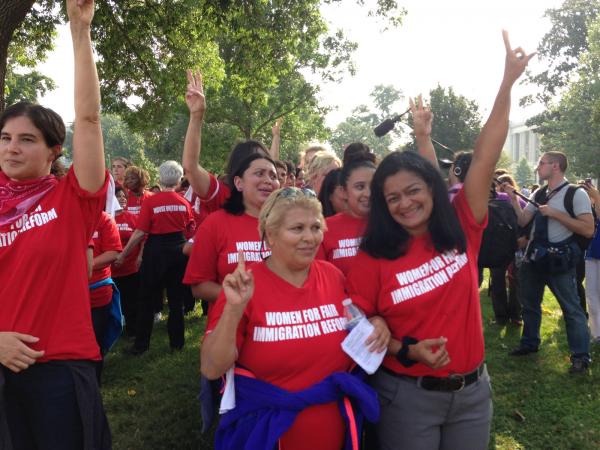
In November 2017, Pramila Jayapal won her Congressional election bid and became the first Indian-American woman in the House of Representatives.
Jayapal (D-WA) is also an immigrant: Her parents sent her from her home in India to the US to attend college when she was 16 years old. She stayed, got an MBA from Northwestern University, and launched a more than 20-year career in community organizing, working for fair treatment for immigrants and for humane immigration reform. In 2013, President Obama named her a White House Champion of Change.
Prior to entering the House of Representatives, Jayapal served in the Washington State Senate from 2015 to January 2017. Before that, she founded the Hate-Free Zone Campaign of Washington to counteract the rise in hate crimes against Arabs, Muslims, and South Asians in the aftermath of 9/11. Under her leadership, the campaign developed into OneAmerica, a national immigrant-advocacy organization.
Green America editor-in-chief Tracy Fernandez Rysavy talked with Rep. Jayapal about her history-making election win, the powerful positive impact immigrants have on America’s economy, and her recent actions fighting President Trump’s anti-immigrant executive actions, as well as her plans for moving forward.
Green America/Tracy Fernandez Rysavy: Thank you for your work on President Trump’s recent anti-Muslim and anti-refugee executive orders. You’ve called them “inhumane and barbaric.” Would you mind elaborating on your powerful statement?
Rep. Pramila Jayapal: Those are very strong words, and I want people to understand the degree to which these executive orders are not just a piece of legal paper but are tearing at people’s humanity. When you say “inhumane and barbaric,” they hopefully pay attention and recognize and think about what’s inhumane and barbaric.
We’re leaving kids with their faces pressed against the glass, waiting for their parents to come home and not sure they will. We’re leaving family members sobbing in airports, because the person they thought they were going to hug after three years apart is on a plane being deported somewhere else. It signals intentionality from the president. You can do unfair and unjust things, but if you do inhumane and barbaric things, it signals intentionality.

 In 2013, as a WA State Senator, Pramila Jayapal spoke at a OneAmerica rally to protest Congressional inaction on fair immigration reform. Photo courtesy of OneAmerica.
In 2013, as a WA State Senator, Pramila Jayapal spoke at a OneAmerica rally to protest Congressional inaction on fair immigration reform. Photo courtesy of OneAmerica.
Green American/Tracy: After Homeland Security started enforcing Trump’s executive orders banning refugees and Muslims from seven countries, refugees who had just arrived in the US thinking they’d been granted asylum were sent back to their home countries, some perhaps to dangerous situations. Before a federal court blocked the executive orders from further enforcement, you were at the forefront of stopping at least one plane about to deport refugees from taking off at SeaTac Airport. Can you tell us what happened?
Rep. Jayapal: I want to give credit to Courtney Gregoire at the Seattle Port Authority, Rep. Suzan DelBene [D-WA], Jorge Barón and the Northwest Immigrant Rights Project, and the ACLU.
The ACLU filed a temporary restraining order [on behalf of two individuals who were on a plane and about to be deported under the executive order]. I’ve been in this situation before [as an immigrant advocate]. They asked me to sign a brief on it, and I signed.
Within four or five hours, we got the judge to grant a TRO [temporary restraining order]. We had to get to the plane, which was ready to take off, to get the two people on it. We literally had to get it to come back to the gateway. Jorge Barón was holding the phone [at the end of the jetway] saying, “This plane cannot depart,” while we were showing [gate agents] the TRO to get the plane to come back. They had to re-attach the bridgeway, so the plane would not leave.
Suzan DelBene and I were trying to push this to Customs and Border Protection. They would not talk to us. So I said, “Either they come here, or I will go to them.”
They were in a secured area, so [the gate agents] said, “You can’t go to them.” But I said I was going to go through, and if that shut down the airport, that wasn’t my intent, but that’s what I would do.
So they got a bus and took us through the back recesses of the airport to the CBP area. We started banging on their door, because it was locked, until the director of the CBP came. We also got the governor [Jay Inslee] and [Senator] Patty Murray [D-WA] on the phone and demanded that these people be allowed to get attorneys. CBP was telling us they weren’t going to have attorneys. We did finally get the two off the plane, got them attorneys, and got them released.
We are still hearing so many troubling stories. Not only Muslims from those seven countries are being barred from entering the US, but a Kashmiri Muslim Olympian in India who was coming to the US to compete was told he couldn’t have a visa because of Trump’s immigration order.
There’s so much fear and so much in limbo. Legal permanent residents still being stopped, even though Secretary Kelly [of Homeland Security] said it’s in the interest of national security that they be allowed in the country. But there are reports of them being stripsearched or subjected to additional searching sometimes for hours. It’s demeaning and totally outrageous.
[Editor’s note: Rep. Jayapal and Sen. Kamala Harris (D-CA) have introduced legislation that would guarantee access to legal counsel for anyone detained while attempting to enter the US. Hundreds were detained by Homeland Security at US airports immediately following Trump’s order. Many were held for more than ten hours without access to phones or the flood of lawyers who joined protesters at airports attempting to help them, according to the Los Angeles Times.]
Green American/Tracy: You’ve also co-sponsored legislation that would protect the DREAM Act, [keeping children who were brought into the US through no fault of their own from being deported]. This gets at my heart, as a mother. How hopeful are you that this legislation will get passed?
Rep. Jayapal: I really think there are a lot of representatives who believe we have to welcome these young people into the country. There’s bipartisan sponsorship for this bill in the House and in the Senate.
I wasn’t an original sponsor of the bill. A Democrat now has to bring a Republican to co-sponsor with you if you want to be on the bill. I was able to work with Dave Reichert [R] in Bellevue, and we signed on together. Congressman Newhouse [R] from Yakima also signed on.
I think the bill does have a real shot. There are the optics [to consider] for Republicans in deporting a bunch of kids who have never been to the country they may be sent to, many who are valedictorians.
The thing is, the bill is only temporary, only for three years—a first step. What we need to do is to fight for comprehensive immigration that keeps parents here, reform that keeps families together.
Green American/Tracy: There’s also these arguments that allowing Muslims and refugees into the US makes the country less safe, or that they’re taking away jobs. How do we respond to that, in a way that opens minds and hearts?
Rep. Jayapal All research shows that immigrants don’t take American jobs. They fill voids that American workers don’t want to fill, particularly in low-wage jobs. If we were to raise wages, we would find more people wanting those jobs. We need to level the playing field so no one is being exploited, and everyone has a fair shot.
As for security, this has been a red herring for a long time. The current ban doesn’t make us safer; it makes us less safe. I was talking to some very high people in the Iraqi government, and there’s tremendous fear that we are playing right into the hands of people wishing to do us harm, who one official said were “clapping and gleeful” because [Trump’s executive order] helps to drive a wedge between the people they are trying to recruit and the US.
"All research shows that immigrants don’t take American jobs. They fill voids that American workers don’t want to fill, particularly in low-wage jobs. If we were to raise wages, we would find more people wanting those jobs. We need to level the playing field so no one is being exploited, and everyone has a fair shot."
We’re locking out Iraqi translators who worked with American forces. We need them!
Here’s a more general comment: It has never been right—including during WWII, with the Japanese internment— to pit security against liberty. Benjamin Franklin said you can’t sacrifice temporary security for liberty; otherwise you’ll have neither.
Green American/Tracy: You’ve had quite a history of working on behalf of immigrants in the nonprofit sector. Why leave that and get into politics?
Rep. Jayapal: [laughs] I never thought I’d go into politics, but after 15 years of working to get the things done we need to do, I realized it’s important to have people from the movement, people who can help organize in politics, and to get immigrants, women, and people of color in politics—people whom you don’t have to explain everything to. It’s just another platform for organizing. And it’s important to have organizers in these platforms.
Green American/Tracy: What is empowering and what is challenging about being the first Indian-American woman in the House of Representatives?
Rep. Jayapal: It’s amazing to be the first, always. It’s empowering and challenging. A big challenge is, why are we only having it now? But it’s great to be one of only 11,000 who have served, to be the first, and to bring the perspective that we bring. It’s not just about what we look like and checking a box. But how do we share hearings, how do we look at legislation, how do we interact with our constituents?
It’s great to see people around the country, young and old, who are inspired to see someone they feel understands their perspective. It energizes them to see someone they can relate to. I get so much love from Indian-American women—and their husbands and fathers, too—who just see a different path for themselves. I take that really seriously. Every step I move forward, I want to make sure I bring people with me. What’s challenging: I wish there were more of us. We need more of us. I also think that it’s challenging because it’s very, very personal.
Green American/Tracy: I know you’ve gotten death threats for your proimmigrant activism in the past. Does that kind of thing still happen?
Rep. Jayapal: Not death threats, but I get nasty hate stuff. I try not to read comments at the end of articles; they’re just so horrible. You have to be strong. You have to pull yourself together because so many people are depending on you.
Green American/Tracy: You founded the nonprofit OneAmerica after 9/11 in response to a wave of hate crimes against the US Sikh and Muslim population. Do you feel we’ve gone backwards as a country in terms of prejudice since then?
Rep. Jayapal: In some ways we’ve gone backwards, in that the legislation and EOs are horrific and in some ways worse than what happened after 9/11. Maybe not as bad as 1942—it’s hard to know. 9/11 was a massive wedge in this country’s history, and in the name of security, we’ve allowed a lot of things to happen.
However, I was just saying in a speech this morning that after 9/11, we didn’t have a lot of people standing up for Muslims. It’s interesting to me now that the Muslim ban, more so than the orders on immigration, has been so resoundingly rejected by so many people— at protests, thousands of people at airports, on Twitter and social media. Trump has his base. Our base never showed up in the streets after 9/11 the way they are now. Communities do understand what the stakes are in a way that I haven’t seen for a long time.
Green American/Tracy: OneAmerica was originally called Hate-Free Zone, and you helped cities and towns declare themselves Hate-Free Zones after 9/11. That particular campaign seemed to taper off as, perhaps, post- 9/11 hate crimes died down. Is it time to bring that back?
Rep. Jayapal: That’s one of the things I want to do. We did a Hate-Free Zone press conference in December [declaring Washington a Hate-Free State]. We had some amazing signs we’d love to have people all across the country adopt.
Councils across the country have been passing legislation declaring themselves sanctuary cities or hatefree zones. It is coming back again.
We’re better, in part, because we’ve gone through it already, and we have this example of how we can win. We sued the Bush administration, and we stopped registration of Muslims and Arabs.
[Editor’s note: The Bush-era the National Security Entry-Exit Registration System, or NSEERS, required men from 25 so-called “higher-risk” countries—all predominantly Muslim countries except North Korea—to undergo interrogation and fingerprinting before they could enter the US. In addition, up until 2003, they had to report to government offices after 30 days in the US and on a regular basis for additional screening. NSEERS was suspended in 2011 largely due to the controversy surrounding it, and the Obama administration shut down the database at the end of 2016. Not a single person was ever charged with terrorism under NSEERS.]
Green American/Tracy: You were one of the first in Congress to boycott Trump’s inauguration. Why did you feel that was important to do?
Rep. Jayapal: We were getting so many calls from people who were terrified about what their place was in the country, whether they’d even have a place. I felt it was critical that I was with them physically on that day that was bringing so much despair to many of my constituents.
I did a round table, and it was emotional. It was difficult but also uplifting. I just felt I could not stand there with a man who has been so divisive. We kept waiting for him to go from being the divisive candidate to being the unifying president, but he didn’t—which was incredibly disappointing. Maybe not surprising on some level.
I wasn’t going to stand on a stage with someone who has put a Breitbart News editor in his cabinet, along with putting in someone who has joked about the KKK and used the N-word as Attorney General. I couldn’t see standing there and allowing my presence to be taken as condoning that president. It wasn’t meant to be a boycott, just my decision, but Trump turned it into a boycott when he Tweeted insults at [Congressman and Civil Rights activist] John Lewis.
Green American/Tracy: What else can people do to combat hate?
Rep. Jayapal: First of all, we can’t have people getting tired or thinking their voice doesn’t matter. Stay engaged. Do what you need to do to sustain yourself, but stay engaged.
There are a lot of us who have friends or family members—I have them—who voted for Trump and live in battleground states that are important. We have to have conversations with people we know and love. Many of us don’t want to bring that to the dining-room table with family. We don’t want to drive a wedge. But this is personal and political. Talk about how you get beyond this hate.
Engage with people: “I love you, I know you love me, but what you’re doing and saying and the person you voted for is so deeply hurtful to me. If we love each other, we have to have that conversation. I’m asking that you please open your ears, and I will do the same.”
Also, we don’t want to be like the other side, who hates government and wants to dismantle it. Government works. We need to build our government properly. We need to have people who care in government. We need to support and amplify each other.







